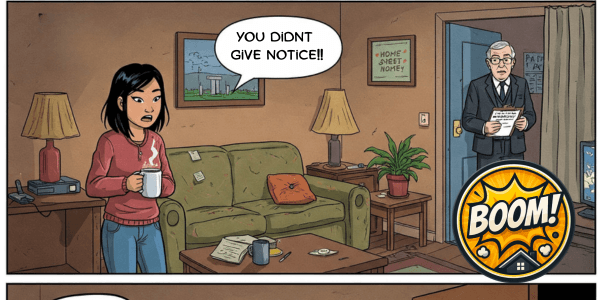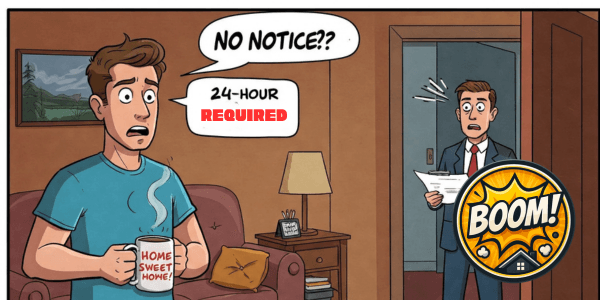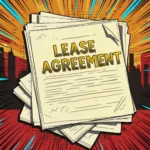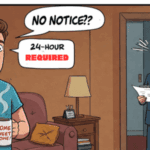Can Your Landlord Enter Your Rental Without Notice?

- Can Your Landlord Enter Your Rental Without Notice?
- Introduction – Can landlord enter without notice
- Know Your Rights: Can a Landlord Enter Your Rental Without Notice?
- Common valid reasons that typically allow a landlord right of entry (with proper notice) include:
- Landlord Entry Laws in California: Specifics You Need to Know
- The Key Exception: Emergency Entry (No Notice Required)
- What Constitutes Illegal Landlord Entry?
- Conclusion – Can landlord enter without notice
- FAQ – Can lordlord enter without notice
Introduction – Can landlord enter without notice
Your rental property is your home, a private space where you have a right to peace and privacy. But what happens when your landlord needs access? A common concern for renters is: Can landlord enter without notice? Understanding landlord entry laws is crucial for protecting your privacy and ensuring your landlord respects your space.
While landlords do have a right to access the property they own, that right is not unlimited. In most cases across the United States, and especially in California, landlords must follow specific rules regarding when and how they can enter a tenant’s occupied unit. This involves providing proper landlord notice to enter before showing up at your door. This article will walk you through the general rules for landlord right of entry, dive deep into landlord entry laws in California, explain the critical exception for landlord emergency entry, and tell you what to do about illegal landlord entry.
Know Your Rights: Can a Landlord Enter Your Rental Without Notice?
At the heart of rental agreements is the tenant’s right to quiet enjoyment. This legal principle means you have the right to use and enjoy your rental property without unreasonable interference from the landlord. A key component of this is your tenant rights privacy regarding your home.
Because of your right to privacy and quiet enjoyment, landlords generally cannot just walk into your apartment or house whenever they please. They must have a valid reason for entering and, in most situations, provide you with advance notice or landlord emergency entry. The specific landlord access laws vary significantly by state, but the requirement for notice is a widespread standard.
Common valid reasons that typically allow a landlord right of entry (with proper notice) include:
- Making necessary or agreed-upon repairs or improvements.
- Performing inspections (e.g., move-out inspection, periodic safety checks as allowed by the lease/law).
- Showing the property to prospective tenants, buyers, or lenders.
- In cases of a genuine emergency (this is an exception to the notice rule, discussed below).
- If you have abandoned the property.
- Pursuant to a court order.

Landlord Entry Laws in California: Specifics You Need to Know
California has clear laws governing when and how a landlord can enter a tenant’s unit. If you rent in the Golden State, it’s vital to be familiar with these rules, primarily found in California Civil Code § 1954.
California’s Notice Requirement: 24 Hours Written
Under California law, a landlord generally must provide at least 24 hours’ written notice before entering your rental unit. This notice must be delivered to you personally, left with someone of suitable age at the premises, or posted on the property in a conspicuous place. Mailing the notice is also an option, but typically requires slightly longer notice (e.g., 6 days) to account for delivery time.
Valid Reasons for Landlord Entry in CA (Civil Code § 1954):
California law specifically outlines the acceptable reasons for a landlord to enter. These are very similar to the general reasons mentioned above, but it’s the legal basis under California Civil Code 1954:
- In case of emergency (discussed below).
- To make necessary or agreed-upon repairs, decorations, alterations, or improvements.
- To show the dwelling to prospective tenants, buyers, or lenders.
- When the tenant has abandoned or surrendered the premises.
- Pursuant to court order.
- For an initial inspection before the tenant moves out (requires specific written notice).
Timing of LandLord Entry in California
Even with proper notice and a valid reason, entry in California must generally occur during normal business hours (typically considered Mon-Fri, 8 am to 5 pm), unless the tenant has agreed to a different time or it is a true emergency.
Knowing these specifics about landlord entry California is key to asserting your CA tenant rights entry effectively.
The Key Exception: Emergency Entry (No Notice Required)
This is the primary scenario where a landlord can enter without notice. In a genuine landlord emergency entry, where there is an immediate threat to life, health, or property, the landlord does not need to provide advance notice.
What constitutes an emergency? Think of situations like:
- A fire
- Severe flooding from a burst pipe
- A gas leak
- Serious structural damage requiring immediate assessment or repair
A minor leak, a clogged drain (unless it’s causing immediate overflow and damage), or routine maintenance are generally not considered emergencies that bypass the notice requirement. The emergency must be real and require immediate action to prevent significant harm or damage or it’s not a valid landlord emergency entry reason.
What Constitutes Illegal Landlord Entry?
Any entry by the landlord (or their agent) into your rental unit that does not meet the legal requirements in your state is considered illegal landlord entry. This includes:
- Entering without a valid reason permitted by law or the lease.
- Entering with a valid reason but without providing the required notice (unless it’s a documented emergency).
- Entering outside of allowed times (e.g., late at night) without your consent or an emergency.
- Using harassment or repeated, unreasonable entry to disturb your peace and quiet.
Illegal entry is a violation of your privacy and your right to quiet enjoyment. It’s a serious matter and you have options to address it.
Your Options if Your Landlord Enters Illegally
If you believe your landlord has entered your unit illegally, here’s what you can do:
- Document Everything: Note the date and time of the entry, how you found out, and any witnesses or evidence (like doors left unlocked, items moved, etc.).
- Communicate (Ideally in Writing): Contact your landlord. Start with a calm conversation, but follow up with a written communication (email or letter) referencing the incident and reminding them of the legal requirements for entry in your state (mentioning California Civil Code § 1954 if applicable) and demanding they follow the law in the future.
- Send a Formal Written Notice: If the behavior repeats, send a more formal letter, perhaps via certified mail, outlining the violations and stating your rights. Keep a copy for your records.
- Contact a Local Tenant Advocacy Group or Housing Authority: These organizations can provide free or low-cost advice, mediate disputes, and inform you of your rights and local procedures.
- Seek Legal Advice: If the illegal entries are persistent or feel like harassment, consulting with a landlord-tenant attorney or legal aid service is advisable. In some cases, repeated illegal entry can be grounds for legal action or even allow you to break your lease without penalty How to Break Your Lease Without Penalty: An Essential 4 Step Guide due to a breach of your right to quiet enjoyment. You may also need to know How to File a Complaint Against a Landlord.
Conclusion – Can landlord enter without notice
Generally, no, your landlord cannot enter your rental property whenever they want without telling you first. Your privacy and peace are protected by law through your right to quiet enjoyment. Landlords must typically provide advance written notice (24 hours in California) and have a valid reason for entry.
The significant exception is a true emergency, where immediate entry is necessary to prevent major damage or harm. If your landlord violates these rules, document the incidents and communicate with them in writing. Don’t hesitate to seek help from tenant advocacy groups or legal professionals if needed.
Knowing your rights regarding can landlord enter apartment rules empowers you to ensure your home remains your private sanctuary.
Disclaimer: This article provides general information and is not intended as legal advice. Landlord-tenant laws are complex and vary by jurisdiction. For advice specific to your situation, consult with a qualified attorney or a local tenant’s rights organization in your area.
FAQ – Can lordlord enter without notice
Can a landlord legally enter my apartment without giving me notice?

Generally, no. Landlord entry laws in most places, including California, require landlords to provide advance notice before entering your rental unit, except in true emergencies. This protects your tenant rights privacy and right to quiet enjoyment
How much notice does a landlord have to give before entering in California?

California law, specifically California Civil Code § 1954, requires a landlord to provide at least 24 hours’ written notice before entering your rental unit, unless there is an emergency
What are considered valid reasons for a landlord to enter my apartment?

Valid reasons for landlord entry, with proper notice, typically include: making repairs, performing inspections, showing the property to prospective tenants or buyers, or as ordered by a court. In California, these reasons are detailed in Civil Code § 1954.
What is a landlord emergency entry, and does it require notice?

Landlord emergency entry is when a landlord enters your property without notice due to an immediate threat to life, health, or property. Examples include a fire, severe flooding, or a gas leak. Routine maintenance or minor issues are not emergencies.
What should I do if my landlord enters my apartment illegally?

If your landlord enters illegally (without a valid reason or proper notice), document the incident, communicate with your landlord in writing about the violation, and if the problem persists, consider contacting a tenant advocacy group or seeking legal advice.
How to File a Complaint Against a Landlord: A Comprehensive 3 Step Guide
Do landlord entry laws vary by state?

Yes, landlord access laws and renter’s rights concerning entry vary significantly from state to state. While the requirement for notice is common, the specific notice period (e.g., 24 hours in CA), acceptable reasons for entry, and your legal options if they violate the law can differ. Always check your local and state laws.

How to Get Your Security Deposit Back After Moving Out: In 4 Easy Steps
How to File a Complaint Against a Landlord: A Comprehensive 3 Step Guide


